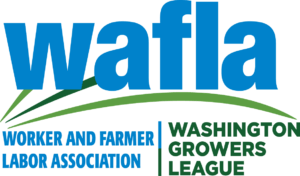Western Innovator: HR director understands foreign farmworkers
Western Innovator: HR director understands foreign farmworkers
By Don Jenkins, Capital Press
LACEY, Wash. — U.S. agriculture increasingly relies on foreign workers, mostly from Mexico, but the demand for foreign labor doesn’t seem close to exhausting the supply. Roxana Macias attributes this to the “power of acquisition.”
U.S. wages, many times higher than in Mexico, allow farmworkers to go home and acquire houses and start businesses, said Macias, human resources director for the Worker and Farm Labor Association.
The association, based in Washington, helps farms in several states, including Oregon and Idaho, hire seasonal farmworkers on H-2A visas. The Biden administration has added rules to the H-2A program on the premise foreign farmworkers are attractive to hire because they are easy to abuse.
The system isn’t perfect, but foreign workers benefit from U.S. wages, Macias said. “I know there’s a lot of criticism, but I’ve seen it, I’ve lived it, and I’ve seen how much we can change people’s lives.”
Until recently, the Worker and Farm Labor Association was known as WAFLA, an acronym for its original name, the Washington Farm Labor Association.
It works out that the first word in the new name is “worker.” The organization is made up of family farms and seasonal employees, according to its website. Macias’ official title is “chief people and community officer.”
Grew up in Prosser
Macias, 36, grew up in Prosser, Wash., the daughter of farmworkers. Her grandfather was a bracero, a Mexican resident allowed to enter the U.S. to work on farms.
The legacy of the Bracero program of the 1940s and 1950s hangs over the H-2A program, Macias said. Working in the U.S. was a blessing and a curse, she said. “It was indentured servitude to a degree.”
Immigration reform in 1986 made her father a legal resident. “He was in the right place at the right time,” she said.
Macias left Prosser for the University of Washington and had plans to never work in agriculture. She earned a degree in political science and economics and got a job with the Washington Employment Security Department.
She worked on wage surveys for farmworkers, but said she was frustrated by economists who ignored such things as the difference between selective and strip harvesting in assessing pay scales.
She got a job with WAFLA in 2013 as human resources program manager. In 2015, she went to work as director of compliance for CSI Visa Processing, a farmworker recruiting company in Mexico owned by her husband.
Rule changes
She came back to WAFLA in 2022. These days, she’s busy keeping up with H-2A rule changes.
“It’s been hard because they’re changing everyday,” Macias said. “The Biden administration has been a little heavy-handed.”
A Department of Labor rule issued last spring has been especially contentious. It has several provisions. One makes employers responsible for making sure farmworkers buckle up in company vehicles.
It makes sense to require vehicles have seat belts, but the rule puts farmers in a parental role to adults, she said. “Culturally speaking, I live in Mexico half the year, most people don’t wear a seat belt. It’s not a common practice,” she said.
The rule’s most controversial provision gives foreign farmworkers the right to form unions and act collectively for mutual aid and to enforce their rights. The right extends to U.S. workers on the same farm.
The Biden administration denies giving select farmworkers the right to collectively bargain contracts. But the rule resembles union rights granted in the National Labor Relations Act, which excludes farmworkers.
Attorneys general from 22 states oppose the rule, arguing it violates the NLRA. A judge stayed the rule in 17 states, but it remains in effect elsewhere, including Washington, Oregon and California.
The Worker and Farm Labor Association is a plaintiff in one of several lawsuits seeking to abolish the rule in all 50 states. Meanwhile, Washington farmers must follow a rule giving vague NLRA-like protections to farmworkers.
“We don’t know how the (labor) department is going to interpret actions in an investigation,” Macias said.
Farms that hire foreign farmworkers already have a target on their backs, she said. Employers are subject to inspections by numerous state agencies. “You kind of have to open your books,” she said.
Macias advises farms to not let problems fester. “Are the demands reasonable? If they’re related to health and safety, you should fix that anyway,” she said. “Just schedule one more cleaning of the porta potties.”
People sacrifice by leaving their homes and families to work in the U.S, she said. “The least we can do is be supportive.”
H-2A demand grows
Demand for H-2A workers grew again this year. For the federal fiscal year ending Oct. 31, applications to hire H-2A workers increased 7.7% nationwide, according to the U.S. Department of Labor. In Washington, 35,884 positions were certified available for foreign farmworkers, an all-time high.
In a recent article, University of California-Berkley professor Alexandria Hill and UC-Davis professor James Sayre said the incentives to come to the U.S. under the H-2A program outweigh entering the country illegally.
H-2A workers get legal status, employer-provided housing and guaranteed wages. According to Hill and Sayre, they earn five to 14 times more than they would working on farms in Mexico.
Macias said she went to poor regions in Mexico with her husband, Guillermo Mathus, to recruit farmworkers. For every worker who gets to the U.S., thousands more wait to jump-start their lives with higher earnings, she said.
“The ideal would be that they could stay and do that within their own communities, but that’s not the world we live in,” Macias said.
